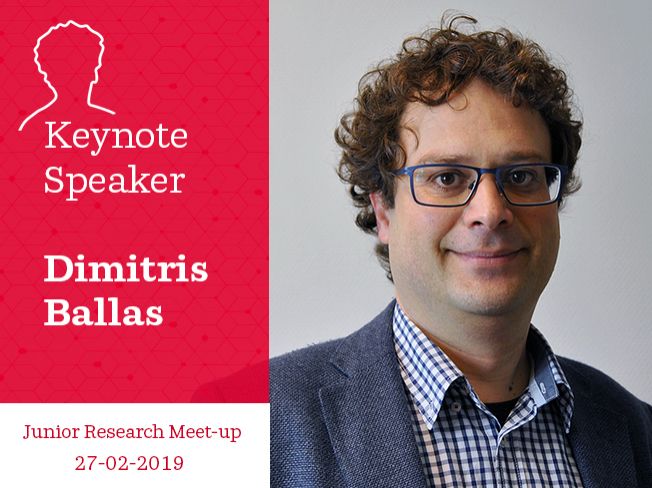Keynote Junior Research Meet-up: Dimitris Ballas - ‘The Economic Geography of Happiness’

Dimitris Ballas is a professor of Economic Geography at the faculty of Spatial Sciences, University of Groningen. Professor Ballas has published widely in the fields of social and economic geography, social and spatial inequalities, regional science and Geoinformatics in the Social Sciences, including highly cited articles and books on the geography of happiness and well-being, as well as on spatial microsimulation and related quantitative methods.
How the link between geography and happiness was born
This link goes way back to the time when, as an undergraduate student in Economics, Dimitris Ballas’ got inspired by the work of scholars who used utility theories to decide on the most efficient allocation of resources and to inform policy on how to maximize social welfare. The inspiration he got from this work was coupled with his strong interest in the determinants of social and spatial and inequalities and how these relate to issues of social justice. In his postgraduate academic career, prof. Ballas first started doing research on local labour markets and the social and spatial inequalities associated with it. As these social and spatial inequalities were also closely associated with people's happiness and wellbeing, a key question to be examined was: What is the impact of spatial disparities in local labour markets upon happiness and well-being? Since 2005 prof. Ballas has conducted extensive research to try to answer this question, with one of his most recent projects focusing on the possible impact of Basic Income policies upon well-being.
Make the world a happier place
“I hope that my work on the geography of happiness will improve our understanding of what makes people happy and that it will inform policy choices that can increase happiness”. According to prof. Ballas, social and spatial inequalities have a detrimental impact on happiness. Happiness can be increased by public policies that reduce these social and spatial inequalities, even if another consequence of these policies is a reduction in people’s income. “At the heart of this argument is the evidence suggesting that happiness is not just dependent on what we have as individuals, but that it also depends on the happiness of others.” This evidence motivates Prof. Ballas’ work on the geography of happiness. The world can become a happier place if we have a better understanding of the factors affecting our perception of group and place identity. Furthermore, we should increase our knowledge on feelings of affiliation and belonging, and the ability to feel solidarity with other people and places.
What public health and social geography can learn from each other
“First, from a methodological point of view, public health researchers can benefit from a comprehensive geographical approach to subjective happiness and well-being to address the extent to which subjective happiness may be attributed to ‘individual’ (e.g. employment status, age-group), ‘household’ (e.g. household income, accommodation type and size) and/or wider ‘contextual’ circumstances and characteristics (e.g. climate, socio-economic environment) across the world. Adopting a comprehensive geographical approach can also help to establish the relative importance of such characteristics in different countries and within regions and cities in a country.” Whereas prof. Ballas describes many ways in which public health researchers can learn a lot from the field of social geography, he also thinks that economic and social geographers have a lot to learn from public health. “Perhaps the best example is the work of world leading health scientists and social epidemiologists Richard Wilkinson and Kate Pickett demonstrating how the relationship between income distribution and well-being is mediated through psychosocial pathways by the impacts of economic structure upon social relationships. According to their Spirit Level theory, lower income inequality is seen to result in societies with more cohesion, greater trust, and cooperation and lower social stress. Economic and Social geographers have a lot to learn from this and they can also face up to the great challenge of adding a city and regional dimension to this work and to revisit traditional debates on social justice from a public health perspective.”
The million dollar question: how can junior researchers succeed in academia?
“I would encourage junior researchers to engage with topics, as much as this is possible, that they feel passionate about and to consider, reflect upon and demonstrate the potential public and societal impact of their work. I also think that it is good to engage with impact-related platforms (e.g. professional blogs, social media and other forms of dissemination that may be emerging) as well as academic journal article writing (and combine the two as much as possible).” With regards to upcoming changes in academia for which junior researchers should prepare themselves, prof. Ballas thinks that the main changes will occur due to growing influence of Information and Communication Technologies. These new technologies will not only play a large role in the way in which research is conducted, but will also be integrated more and more in academic teaching. Lecturers have to become more creative and interactive in the classroom to make sure students will not stay home and attend to the lectures online.
Keynote
In his keynote lecture “The Economic Geography of Happiness” prof. Ballas will discuss how economic geography perspectives can help us identify and understand the socio-economic and spatial determinants of happiness and well-being. The talk will concern questions such as “Does geography matter when it comes to happiness?” and “To what extent does where we live affect how we feel, and why?”
The Junior Research Meet-up will take place on 27 February 2019.



